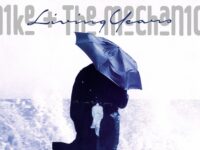Mandoki Soulmates, the brainchild of Hungarian percussion master Leslie Mandoki, has released Living in the Gap, a very modern, progressive mestermunka that visits funkland, jazzland, rockland, and all wonderful points in between.
Now, time for truth or dare (and I choose the former): I’m not too enamored with many current prog bands like Transatlantic or the new Kaipa—bands who always have yet another sidelong 20-minute plus epic up their collective sleeve. Long ago, Genesis guitarist Steve Hackett placed an ad in Melody Maker that read: “Guitarist/writer seeks receptive musicians determined to strive beyond existing stagnant music forms.” Well, if anything, these bands, while subscribing to history are, well (again!), regressive in their prog rock template.
But more truth: I do have a fondness for many current Italian bands like La Maschera di Cera, what with their analog everything and their lovely sense of Italian prog history. And I am that P.T. Barnum “sucker born every minute” when it comes to a rediscovered and remastered treasure from the smokey ’70s like Scotland’s Bodkin or underground British stuff like Grannie, Titus Groan, T2, and Gnidrolog.
That all said, Mandoki Soulmates’ Living in the Gap is a very different animal, and it pushes prog into a very here-and-now wide-open throttle. Quite frankly, for the first time in years my musical compass needed an adjustment. Didn’t Peter Gabriel, in his best Foxtrot voice once declare, “All change!”
Indeed! The opening title track, rather than sporting a Tony Banks’ mellotron sci-fi enthralled “Watcher of the Skies” cosmic vibe, gets spine-bending funky – Stevie Wonder “Superstition” clavinet funky. Cory Henry’s organ swirls and scorches like hot coals in the best of Jon Lord or Keith Emerson tradition. Big jazz guys Randy Brecker and John Helliwell grind a groove, and the whole thing pulses like the Band’s “Life Is a Carnival,” until a scat vocal and an Al Di Meola acoustic guitar lightens the load. Somewhere in the mix (trust me), bandleader Leslie plays an udo, which is everyone’s favorite implosive clay percussion pot. Then the whole thing just erupts with a melodic orgasmic organ solo which continues to grind away at tough passion, with a chaser of funky applause.
Yeah, then it’s “all change” (again!) as the music settles into continuous catchy songs, without a funk to be found. “Young Rebels” begins with soft piano intro and then pulses with big Bobby Kimball vocals, although Chris Thompson, Tony Carey, Nick Eede and others (more about whom later) share vox duties throughout the album. An electric guitar solo echoes the tough searing blues of Free’s axe man Paul Kossoff and then, in the midst of the tune, a sax curls, blurts, and coils with a jazzy touch.
“Turn the Wind” is quiet with a vocal duet between bandleader Leslie and (holy cow!) one Ian Anderson (he of a band of some importance, and of course, named after the inventor of the horse drawn seed drill!). To quote from the portion of Jethro Tull’s “Baker Street Muse,” it’s “a nice little tune.” Things slow even more with the big-voiced piano-acoustic guitar-sax backed earnest ballad, “Where We Belong.”
Ah, “Let the Music Show You the Way” is a simple acoustic guitar strummed song with Ian from Tull (again) singing with (the late) Jack Bruce, who somehow conjures the voice of Cat Stevens! And then our Ian lights up the tune with a flute solo, that recalls so many old vinyl memories.
Just a comment: Winston Churchill famously said: “You can always count on America to do the right thing, after they have tried everything else.” Well, Living in the Gap, while being of Hungarian roots (and a German release!), puts a positive spin on that bon mot: This album, indeed, does “everything else” over the musical pallet; and yet in the end, it is, indeed, a very “right thing” to do.
Now, for a lengthy read, I suggest War and Peace; so, in the interest of brevity, please allow a mention of other highlights. “Two Much Pride” glances at British jazz rock, circa early ’70s and conjures the sound of bands like If and Ian Carr’s Nucleus. “Old Rebels” is another plaintive piano-laced ballad that unifies the album under the “rebel” aegis, and that’s always a nice prog move. Then, “Welcome to Real Life” is yet another brass-enhanced piano and organ ballad that scores high marks on the Languid but Still Really Nice Music meter.
And then there is even more of “everything else.” “Hottest Queen of Cool” gets a cool case of the “Stray Cat Strut” and recalls the art-pop sound of (my beloved) City Boy, circa their Young Men Gone West album, with an addition of a nice Randy Becker trumpet solo and an organ that loves Jimmy Smith’s Back at the Chicken Shack vibe.
Now, I could be wrong; but perhaps, this may be the very first time the Stray Cats, City Boy, Randy Brecker, and Jimmy Smith have ever been used in the same sentence. But that weird lock combination may well be the key to the heart of the appeal of Mandoki Soulmates’ Living in the Gap.
That said, “Wake Up” follows with Leslie Mandoki’s daughter Julia (who co-writes some of the songs) on lead vocals. This is smooth-jazz pop rock with yet another Randy Becker trumpet solo. And then, Ian Anderson leads a vocal ensemble in the brilliant (and total prog delight) “Mother Europe,” a song that sounds like a successful remake of any of the rather dreary (and tech-sound stern) songs from Walk into Light his first solo album.
“I’m Not Your Enemy,” the final tune on Living in the Gap, is a grand summation: It rubs the sticks of organ, guitar, bass, accordion, trumpet, daughter Julia’s voice, and just plain human big love decency to fire up, with bouncing embers, a hopeful pulse that conjures a cauldron with so many desperate elements into a weird (sometimes unwieldy) and quite lovely whole.
In Mark Twain’s The Adventures of Huckleberry Finn, Huck complains about “victuals … cooked by itself [but] in a barrel of odds and ends, it is different. Things get mixed up and the juices kind of swaps around and things go better.” And that’s the beauty of this record: It manages to “swap” all those “juiced” genres into a collective melodic soul.
You know, Leslie Mandoki emigrated to freedom, carried music in his soul. While never forgetting the greatness of progressive rock, he has now passed, szerelem, szerelem (aka love, love) within “the gaps” in the grooves of this lovely album.
And now on to the second trip to this musical smorgasbord.
Mandoki Soulmates’ Hungarian Pictures is sheer delight to the ears of lovers of symphonic prog that glances at the classics, yet still delivers the rock music backbeat punch. Better yet, it mines the melodies of traditional Hungarian folk music.
And, of course, the album plays tribute to classical guy Bela Bartok, who despite being a fav of Keith Emerson (the astute prog listener will, of course, know, ELP pretty much ripped off BB’s Barbado with their hard rocking prog tune “The Barbarian”), is a great Hungarian composer. That said, it’s of import to acknowledge Bartok’s work with collecting folk tunes (with friend Zoltan Kodaly) from the country folk.
Well, truth or dare time once again: First, that bit of Hungarian language, “szerelem, szerelem,” is only possible because I own the very excellent Muzikas album, The Prisoner’s Song. And their Bartok Album provided the Bela quote, “My guiding philosophy has always been the ideal of different nations uniting into brotherhood, despite all the wars and hostility.”
These Mandoki Soulmates albums carve those words into musical commandments.
The seven-part Hungarian Pictures begins with “Sessions in the Village,” which is a joyous ride through a piano and voice intro that suddenly erupts into a folk-jazz euphoria. And truly (as a prog comment) this touches the fun and child-like humor of Sweden’s Samla Mammas Manna. And may I also add an unsolicited plug for the very excellent Kebnekaise, who rocked-up Swedish folk melodies.
“Utopia for Realists” is more dramatic. Quite frankly, it sounds like a tune from a Tony Banks solo record. But it serves as a prologue for the brilliant 19-minute “Transylvanian Dances,” which fuses classical strings, acoustic guitar interludes, folk melodies, and stunning rock music. This one begins with bumpy jumps, and then it gets jazzy, evokes circus themes, honks a bit here and there, spins piano notes into folk dance steps, has amazing percussion, and then moves into its vocal/acoustic guitar/accordion, violin interlude, which is (sort of) a much-extended echo of the mid-section from ELP’s “Take a Pebble.” Wow!
Then, it’s off into a quiet and catchy folk melody that stretches the beauty of the “Dance.” Yeah, that’s Al Di Mealo on nylon-stringed guitar. The tune then rises, out of the mirror pool of folk music extraordinaire, with a tense violin that soars over rock guitar propulsion that (to get all proggy again!) matches the intensity of that very first (and brilliant) album from Italy’s Quella Vecchia Locanda. The epic then vibes out with a heavenly (and quite soulful) organ solo reminding me of Jukka Gustafsson from Finland’s Wigwam. Wow again!
This epic is followed by two really decent tunes, “You Will Find Me in the Mirror” simply oozes with progressive rock sublimity. Ditto for “Return to Budapest,” a song that touches Medieval religious (rather than” locomotive”) breath, with a flute solo from that “too old to rock ‘n’ roll, too young to die” Tull guy!
Ouch! The before-mentioned (that ELP ripped) “Barbado” jazz rocks like something from King Crimson’s brilliant Lizard’s second side “Prince Rupert Awakes” suite. That’s a big (top!) compliment!
“Torch,” the final song on Hungarian Pictures, waves a gentle flagged melody to future children. Yeah, it passes the “torch.” Sure, “stay hungry, foolish, and young.” Perhaps it’s a bit obvious, but after all of this glorious mind-bending music, (perhaps, again!), obvious passion is the best prayer of a parachute for such a wondrous end to this record of Hungarian progressive rock ‘n’ roll (and everything in between) beauty.
- Coincidence – ‘Coincidence,’ ‘Clef de Ciel’ + ‘Archives 1973-1974’ (2024) - November 17, 2024
- Mile Marker Zero – ‘Coming of Age’ (2024) - October 14, 2024
- Burton Cummings – ‘A Few Good Moments’ (2024) - October 7, 2024



